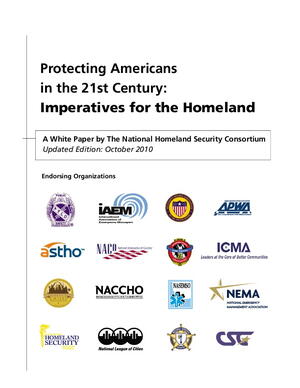
The NHSC is a voluntary group of 21 national associations formed in 2002 in an effort to collaboratively address homeland security issues. The NHSC has identified six priority issues for near-term policy and strategic action by the nation’s leaders:
- Wisely sustain homeland security investments and efforts while creating incentives for innovative and creative solutions
- Allocate the 700 MHz D block radio spectrum to public safety to enhance communications through new technology
- Address immigration reform by moving from debate and conversation to action
- Develop a methodology to measure homeland security performance in ways that recognize the constantly evolving threat
- Make cyber security a priority policy issue for government and the private sector; and
- Develop a more comprehensive and coordinated approach in the rebuilding of communities struck by major disasters.
These recommendations are part of a broader white paper, Protecting Americans in the 21st Century: Imperatives for the Homeland, a document developed by the NHSC in 2008 and updated in 2010. The white paper offers specific recommendations to enhance national homeland security efforts. Areas of focus include: communication and collaboration; intelligence and information sharing; use of the military; health and medical; interoperability; critical infrastructure; surge capacity; sustained resources and capabilities; and immigration, border security and global supply chain security.
The paper urges an equal partnership between state, local and private entities and the federal government in setting national homeland security goals, policies and procedures. “The Consortium is committed to working with our federal partners in charting the path forward and ensuring that our efforts to protect America are united,” said Matthew Bettenhausen, chair of the National Governors Association’s Governors Homeland Security Advisors Council (GHSAC), which, along with ICMA, the International City/County Management Association, is a member of the consortium.
The paper also recommends improvements in the areas of Communication and Collaboration; Intelligence and Information Sharing; Use of the Military; Health and Medical; Interoperability; Critical Infrastructure; Surge Capacity and a Unified National Capabilities Approach; Sustained Resources and Capabilities; and Immigration and Border Security. Specific recommendations include:
- Establishing a sustained and consistent process for soliciting local, state, tribal, territorial and private sector engagement on the full breadth of homeland security issues
- Continuing to implement and expand efforts to ensure timely and effective information sharing across all levels of government and the private sector
- Protecting states’ authority over their National Guard forces and clarifying the circumstances and procedures under which federal active duty forces may be used in operations within the homeland
- Enhancing health and medical readiness to address trauma- and exposure-related injury and disease
- Promoting coordinated development of governance, technology and protocols needed to enhance capabilities for interoperable communications among all levels of government and the private sector
- Strengthening efforts to protect and make more resilient national critical infrastructure; and
- Implementing national reforms to address immigration and border security issues facing local, state and private sector organizations.
The consortium consists of national organizations representing local, state and private professionals involved in delivering public health, safety and infrastructure services. Currently administered by the National Emergency Management Association, consortium members include 21 national organizations representing several hundred thousand members.
